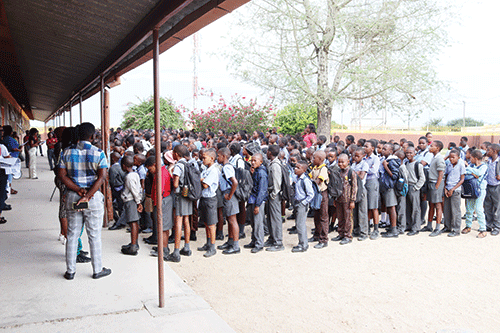Elago Shipanga
With the surge of cholera infections in some parts of the Southern African Development Community (SADC), the Otjozondjupa health directorate has launched a week-long awareness campaign to educate communities about the disease.
The campaign, currently underway in all four Otjozondjupa health districts, is targeting schools, rural areas and peri-urban areas identified as “at-risk communities”.
Olivia Mbabi, an environmental health practitioner in the Otjiwarongo district, said the awareness campaign is a proactive measure by the ministry to empower communities with knowledge about cholera and prepare them should the disease enter the country, given the shared borders with countries currently battling cholera. “Our motto is that prevention is better than cure. We have been busy with a campaign on cholera to ensure that the community is equipped with the right information and knowledge about proper sanitation. The campaign is also targeting schools because we recognise that children can be community champions who can transmit the message further and faster to their families and communities,” she noted.
Cholera, an acute diarrhoea infection characterised by watery diarrhoea, nausea and potentially fatal dehydration, thrives in unhygienic environments with poor sanitation. Mbabi highlighted that some communities lack safe drinking water and proper sanitation. Therefore, they encourage communities to avoid open defecation, and teach them methods to safely relieve themselves where there are no toilets. Cholera is preventable and treatable. Correct handwashing measures, access to safe drinking water, and proper sanitation can keep communities safe from cholera. During a campaign stopover at Karundu Primary School in Otjiwarongo, learners were educated about the signs and symptoms of cholera, and how to prevent it.
Kelly Mukenge, a grade seven learner, expressed gratitude for the health workers who shared valuable information to prevent
cholera. “I have learned so much today, not just about the signs and symptoms of cholera, but also how to treat yourself if you have the symptoms and are faraway from hospital. I thank the health officials for sharing that information with us,” added Mukenge.
Malawi, Mozambique, Zambia, Zimbabwe and Tanzania, along with South Africa as this country’s southern neighbour, are some of the countries in the region which have reported cases of cholera. In early February, an extraordinary summit of SADC Heads of State and Government on the cholera situation in the region endorsed increased investment in Water, Sanitation and Hygiene (WASH) infrastructure, the supply of clean portable water, and efficient waste management,
as recommendations to prevent future outbreaks of cholera.
*Elago Shipanga is an information officer for the Ministry of Information and Communication Technology in Otjozondjupa.


